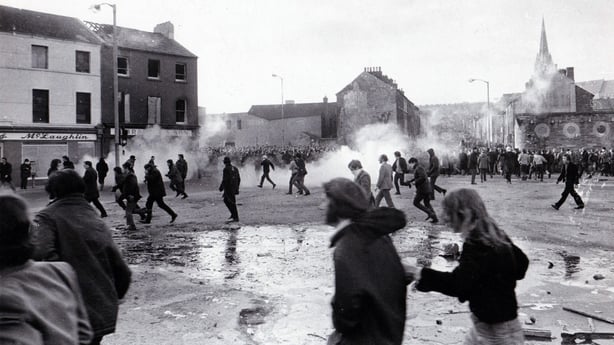None of the soldiers who gave evidence to the Bloody Sunday inquiry will face perjury charges over their testimony to the tribunal.
Fifteen were investigated after the judge leading the public inquiry said British soldiers had lied while giving evidence.
The military was heavily criticised in the findings of the Saville Inquiry into the mass shooting of civil rights marchers in Co Derry in 1972.
A civilian who was an alleged member of the Official IRA was also investigated for perjury offences.
Families of the Bloody Sunday victims said they were disappointed by the decision and said further legal action could not be ruled out.
Thirteen people were shot dead by British soldiers in Derry on 30 January 1972. One of the injured died months later.
The Saville Inquiry found that none of the dead or injured had been posing any threat to the soldiers.
The British government apologised in parliament for the actions of its troops after the publication of the inquiry findings.
Now Northern Ireland's Public Prosecution Service has announced that none of the 16 people reported for alleged perjury are to be prosecuted.

It said the available evidence was "insufficient to provide a reasonable prospect of conviction".
John Kelly, whose brother Michael was shot dead on Bloody Sunday, said the ruling by the PPS that there will be no prosecutions over allegations of false evidence given to the Bloody Sunday Inquiry, was an "affront to the rule of law".
Delivering a statement on behalf of the families, Mr Kelly said: "Why is it that the people of Derry cannot forget the events of Bloody Sunday, yet the Parachute Regiment, who caused all of the deaths and injury on that day, apparently cannot recall it?
"The answer to this question is quite simple but painfully obvious. The British army lied its way through the conflict in the North."
He added: "We consider that today's ruling by the PPS is an affront to the rule of law and a continuation of the injustice that was perpetrated on Bloody Sunday."
Solicitor Ciaran Shiels, of Madden and Finucane, who represents a number of the Bloody Sunday families, said they were disappointed by the PPS decision.
He said: "It is of course regrettable that this decision has been communicated to us only today, some 14 years after the inquiry's unequivocal findings, but less than two weeks before the effective enactment date of the morally bankrupt legacy legislation designed specifically to allow British army veterans to escape justice for its criminal actions in the North of Ireland.
"We will carefully consider the reasons we have received today and do not rule out the prospect of further legal action."
The PPS said three challenging issues had arisen.
The first was that the Bloody Sunday Inquiry had not framed its criticism of the soldiers' testimony in a way that amounted to a criminal standard of proof.
It said, for legal reasons, accounts given by soldiers in 1972 were not admissible as evidence.
It also said that not everyone who had provided evidence to the inquiry had made a witness statement to the PSNI.
Senior Prosecutor John O'Neill said the PPS findings in no way undermined the findings of the Saville Inquiry that those killed and injured were not posing a threat to the soldiers that day.
"We acknowledge that these prosecutorial decisions will be disappointing to the victims and families involved, and that this may be another difficult day for them. We have written to them to explain in detail the reasons for the decisions.
"We would like to provide assurance that these decisions were taken impartially, independently and only after the most thorough and careful consideration of all available evidence and the relevant legal issues."
"We acknowledge that these prosecutorial decisions will be disappointing to the victims and families involved, and that this may be another difficult day for them. We have written to them to explain in detail the reasons for the decisions.
"We would like to provide assurance that these decisions were taken impartially, independently and only after the most thorough and careful consideration of all available evidence and the relevant legal issues."
One of the soldiers considered for prosecution on perjury charges is Soldier F, who is currently being prosecuted for the murder of James Wray and William McKinney and the attempted murder of four other men on Bloody Sunday.
The PPS said the decision would not have any impact on the decision to prosecute Soldier F for those offences.







